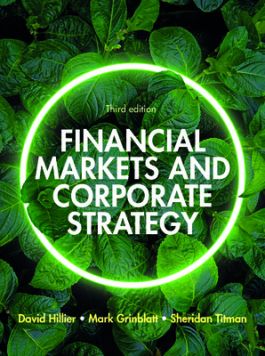Financial Markets and Corporate Strategy: European Edition, 3e
Chapter 1 Raising Capital: The Process and Players
Chapter 2 Debt Financing
Chapter 3 Equity Financing
Part 2: Valuing Financial Assets
Chapter 4 Portfolio Tools
Chapter 5 Mean-Variance Analysis and the Capital Asset Pricing Model
Chapter 6 Factor Models and the Arbitrage Pricing Theory
Chapter 7 Pricing Derivatives
Chapter 8 Options
Part 3: Valuing Real Assets
Chapter 9 Discounting and Valuation
Chapter 10 Investing in Risk-Free Projects
Chapter 11 Investing in Risky Projects
Chapter 12 Allocating Capital and Corporate Strategy
Chapter 13 Corporate Taxes and the Impact of Financing on Real Asset Valuation
Part 4: Capital Structure
Chapter 14 How Taxes Affect Financing Choices
Chapter 15 How Taxes Affect Dividends and Share Repurchases
Chapter 16 Bankruptcy Costs and Debt Holder–Equity Holder Conflicts
Chapter 17 Capital Structure and Corporate Strategy
Part 5: Incentives, information, and corporate control
Chapter 18 How Managerial Incentives Affect Financial Decisions
Chapter 19 The Information Conveyed by Financial Decisions
Chapter 20 Mergers and Acquisitions
Part 6: Risk Management
Chapter 21 Risk Management and Corporate Strategy
Chapter 22 The Practice of Hedging
Chapter 23 Interest Rate Risk Management
The global pandemic restrictions, climate change, geopolitical tensions, and new artificial technologies have fundamentally impacted international financial markets and corporate strategy. Traditional finance theories have been questioned and their application to corporate decision-making has come under scrutiny like never before.
The third edition of Financial Markets and Corporate Strategy provides students with comprehensive and engaging discussions on the strategic challenges facing companies and their financial decisions. Brought to life by real-world examples, international cases and insights from recent research, it guides students through the challenges of studying and practising finance from both an academic and practical viewpoint.
Key Features:
· Fully updated research of the most important topics, data and examples in every chapter.
· Coverage of the impact of climate change, Brexit, the economic growth of China, and new financial technologies
· A stronger emphasis on sustainability, ethics, and corporate governance.
· Updates on accounting standards, bankruptcy laws, tax rules and tax systems.
David Hillier is Professor of Finance, Executive Dean of Strathclyde Business School, and Associate Principal of the University of Strathclyde.
Mark Grinblatt is the J. Clayburn LaForce Professor of Finance at the UCLA Anderson School of Management
Sheridan Titman is Professor of Finance at the McCombs School of Business.

